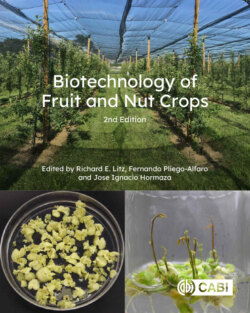Читать книгу Biotechnology of Fruit and Nut Crops - Группа авторов - Страница 162
На сайте Литреса книга снята с продажи.
4.2. Genetic manipulation 4.2.1. Mutation induction and somaclonal variation
ОглавлениеSince the beginning of the 21st century and the expansion of commercial date plantations of micropropagated plants, abnormal off-types have been frequently detected. Most of these abnormal trees were produced via somatic embryogenesis. In contrast, somaclonal off-types are only rarely detected following micropropagation by shoot tip culture; the plantlets are almost always true to type (Zaid and De Wet, 2002a; Kunert et al., 2003; Al Kaabi et al., 2007). Several recurrent off-type phenotypes have been detected in several countries with various commercial cultivars, e.g. ‘Barhee’, ‘Hallas’ and ‘Medjoul’. These include trees producing seedless, parthenocarpic fruits, trees with variegated leaves or with variations in leaf structure, dwarf trees and trees with variations in overall growth patterns (McCubbin et al., 2000; Al-Wasel and Abdelrahman, 2001; Cohen et al., 2004; Gurevich et al., 2005; Al Kaabi et al., 2007; Al-Khalifah and Askari, 2011; El Hadrami et al., 2011b). Many of these off-types were identified only at maturity, i.e. several years after planting in the field and, thus, resulting in large economic losses. This problem has raised concern about the use of somatic embryogenesis for propagating date palm and protocol improvements are essential to prevent the formation of off-types and development of tools to identify them at an early stage in the nursery. Very similar off-types occur in other crops propagated by somatic embryogenesis, e.g. oil palm (Corley et al., 1986) and banana (Damasco et al., 1998; Sahijram et al., 2003). DNA markers have been used to identify date palm somaclonal variants (Saker et al., 2000; Gurevich et al., 2005; Saker et al., 2006; Al Kaabi et al., 2007; Cohen, 2011). Most studies have demonstrated increased genetic variation, suggesting that many genetic and even epigenetic changes have occurred in vitro; most of these changes are not specifically related to certain off-types (Cohen, 2011). Refined protocols were developed to reduce the use of 2,4-D during induction. These, together with molecular assessments of clonal fidelity, have enabled commercial laboratories to reduce the generation of off-types and to remove most of the abnormal trees that were generated.
Somaclonal variation can also cause beneficial changes, i.e. plants with superior agronomic traits (El Hadrami et al., 2011b). Induction of mutations, using chemical mutagens or irradiation, can be used to generate somaclonal variants (Jain, 2007, 2012). This approach has been used to select date palm plantlets for relative tolerance of Bayoud disease (Jain, 2011, 2012). In vitro selection, whereby stress is applied in vitro, can be used to select tolerant lines. Exposing suspension and embryogenic cultures of date palm to varying concentrations of salts (sodium chloride, potassium chloride, calcium chloride) and polyethylene glycol has resulted in enhanced tolerance of salinity and drought stresses (Al-Khayri and Ibraheem, 2014; Al-Khayri et al., 2017c). These studies were limited to the selection and characterization of embryogenic cultures; regeneration of plants with higher tolerance to abiotic stresses was not reported. A similar approach was suggested for the use of Fusarium toxins as in vitro selective agents to select individuals with resistance to the pathogen for Bayoud disease (El Hadrami et al., 2005; Sedra and Lazrek, 2011).
